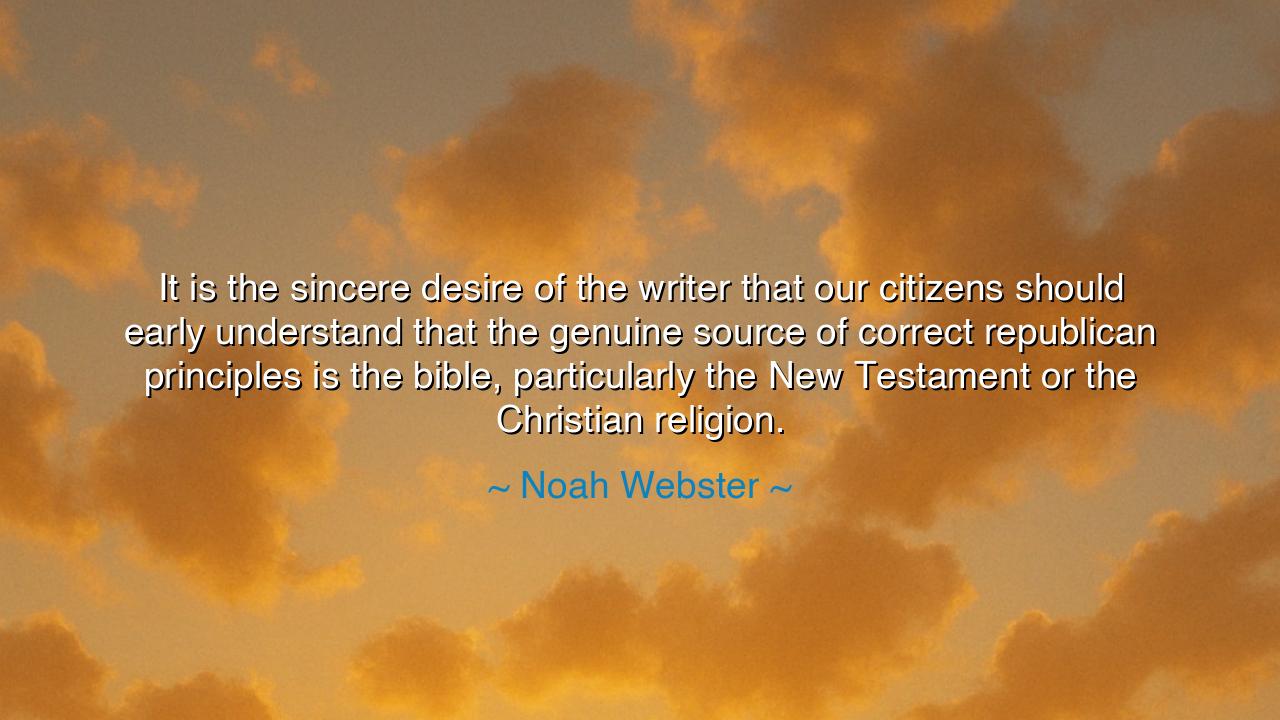
It is the sincere desire of the writer that our citizens should
It is the sincere desire of the writer that our citizens should early understand that the genuine source of correct republican principles is the bible, particularly the New Testament or the Christian religion.






Hear, O children of history, the words of Noah Webster, lexicographer, statesman, and teacher of a young nation: “It is the sincere desire of the writer that our citizens should early understand that the genuine source of correct republican principles is the Bible, particularly the New Testament or the Christian religion.” These words, written in the dawn of the American republic, are not idle musings, but the solemn conviction of one who believed that the health of a people must rest upon foundations deeper than mere laws and politics. Webster, who gave America her first great dictionary, also sought to give her a moral compass, declaring that republican principles—the virtues that guard liberty—must be nourished by the moral teachings of Scripture.
For what is a republic but the union of free men and women under the rule of justice? Yet freedom, if unmoored from morality, decays into chaos. Liberty without virtue becomes license, and license becomes tyranny. Webster looked to the Bible, and especially to the New Testament, not as a tool for sectarian dominance, but as a fountain of principles: humility, justice, self-sacrifice, and love of neighbor. These, he believed, were the virtues that would sustain a free people, preventing their freedom from collapsing into corruption. Without such a moral ground, the republic would be but a house built upon sand.
History confirms this truth. Consider the rise and fall of the Roman Republic. In its youth, Rome was held together by the ancient virtues: discipline, fidelity, sacrifice for the common good. But as wealth and conquest grew, the virtues waned. Self-interest replaced duty, greed replaced justice, and ambition devoured the republic from within. The form of government remained for a time, but its spirit died, and the empire of Caesar rose from the ashes. Webster, knowing this history, sought to guard the fledgling United States from a similar fate by pointing her people toward a moral law higher than human decree.
Yet Webster’s conviction also reflects the era in which he lived. The founders of America, though diverse in their private faiths, often spoke of religion and morality as the twin pillars of liberty. George Washington, in his farewell address, declared that without them, national prosperity could not endure. To Webster, the Christian religion offered not only personal salvation, but also a framework for civic virtue: respect for authority, honesty in trade, compassion toward the poor, and devotion to truth. Thus, he saw in the New Testament the seedbed of a republic’s survival.
But let not his words be misunderstood. Webster does not say that all must profess the same creed, nor that the state must enforce one faith upon its people. Rather, his warning is that a republic without virtue, without moral principle, will perish. Religion, in his view, was the strongest fountain of such principle. And so he urged that citizens, from their youth, be instructed not only in laws and liberties, but in the moral teachings of faith that could shape them into worthy guardians of freedom.
The lesson for us is as sharp today as it was in Webster’s time: freedom cannot endure without virtue. Laws and constitutions are powerless if the hearts of men are corrupt. Whether one draws strength from Christianity, from another faith, or from the moral wisdom of conscience, the truth remains: a republic is only as strong as the character of its people. To build a society upon greed, deceit, or indifference is to invite its collapse. To build it upon justice, humility, and love is to secure its endurance.
So I say unto you, heirs of liberty: seek out the moral sources that strengthen the soul. If you are Christian, let the New Testament’s call to selflessness and truth shape you. If you are of another faith, let its wisdom guide you toward justice. If you walk without religion, let conscience still bind you to the eternal law of right. For Noah Webster’s wisdom remains: republican principles do not spring from parchment or politics alone—they spring from the moral soil of the human heart. Guard that soil well, and your freedom will not wither.






AAdministratorAdministrator
Welcome, honored guests. Please leave a comment, we will respond soon